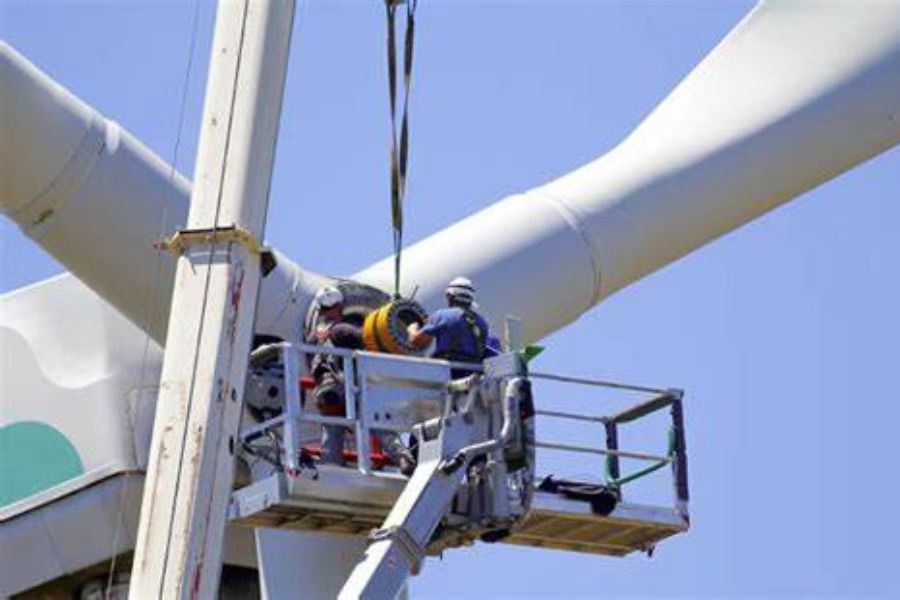China Transmission Swings to Loss after Shifting Business Gears

China High Speed Transmission has logged a first-half loss and a revenue decline, hit by falling prices of wind power equipment and by the impact of the Covid pandemic. However, a foray into commodity trading outside its core business may have been a key factor
Key Takeaways:
- The company reported a year-on-year revenue fall of just under 9% in the first half and posted a net loss of 78.7 million yuan
- With rising receivables in its commodity trading business, the company needed to borrow more to bolster liquidity, swelling its total liability by nearly 42% in six months to 22.46 billion yuan and almost doubling its financial costs
By Ken Lo
Why would a company that produces gearboxes for wind turbines make a major sideways move into the volatile world of commodity trading, generating financial turbulence for its business?
That’s a question arising out of the latest earnings report from China High Speed Transmission Equipment Group Co. Ltd. (0658.HK), a maker of heavy duty gears for industries such as wind power and transport.
Citing lower prices of its wind power components and the impact of the Covid-19 pandemic on sales,China Transmission slipped into the red on a net basis in the first half of the year. Sales revenue fell just under 9% to 9.69 billion yuan ($1.4 billion) and the bottom line swung to a loss of 78.7 million from a 723 million yuan profit during the same period last year. Taken aback by the downward shift, investors sent the stock tumbling nearly 10% to HK$4.42 in the trading day after the financials were announced.
In its earnings report, the company attributed the setback to its sale of a 43% equity stake in Nanjing High Speed Gear Manufacturing, which makes and sells gears, gear boxes and other components. From the sale, the company incurred an income tax bill of 315 million yuan as well as interest payments of around 86 million yuan arising from a put-option liability related to the divestment.
Still, there may be more to this than meets the eye. The earnings report did not itemize the profit or loss of each operation. But given that revenues declined by almost 9% and assuming net profit fell by the same margin to 670 million yuan, the company should still be left with a profit of around 270 million yuan, instead of a deficit of 78.7 million yuan, once the tax and interest payments are deducted.
In that case, what could explain the shortfall? The answer lies in a surge of financial costs, by almost 96% to 264 million yuan, figures that investors should take note of.
New business in need of capital influx
China Transmission started to engage in commodity trading in late 2020. In its financial report for that year, the company said the new venture accounted for about 60% of its overall trading business and mainly involved buying and selling oil products and electrolytic copper. The remaining 40% was made up of its steel supply chain business, focusing on crude coal, upstream ingredients, charcoal and bulk steel.
Commodity markets have been highly polarized this year, with prices of steel products falling by 20% while coal and oil prices remained high. The volatility has put pressure on the financing capacities of trade intermediaries, and China Transmission’s accounts have felt the strain.
The half-year earnings report showed that the company’s inventories grew from 5.21 billion yuan to 5.82 billion yuan, while trade receivables jumped from 4.43 billion yuan to 5.84 billion yuan. The company’s total liability surged by nearly 42% to 22.46 billion yuan in just a half year, pushing up its debt ratio by 9.2 percentage points to 62.7%, mainly because of bank loans and accrued interest related to the put-option debt from the equity sale. All in all, its financial costs almost doubled.
China Transmission is a leading supplier of gear equipment for the wind power industry. Its transmission products are widely used in onshore and offshore wind energy projects. For example, its 2 MW to 7 MW products have been sold to wind power equipment makers at home and abroad, including the likes of GE Renewable Energy from the U.S., Siemens Gamesa Renewable Energy based in Germany and Spain, Suzlon from India and Doosan from South Korea.
Falling income from core products
In terms of revenue structure, income related to wind power and industrial gear transmission equipment fell nearly 11% from a year earlier to 6.44 billion yuan, accounting for just over 66% of total revenue. Sales of gear transmission equipment for rail transportation fell by just over 9% to 184 million yuan, while revenue from the trading business dropped by around 3% to 3.044 billion yuan.
Gear boxes are a key component in a wind power system, making up around 11% of the overall cost, second only to turbine blades and more expensive even than generators, according to Topsperity Securities.
In recent years, domestic gearbox manufacturers have outcompeted their foreign counterparts in the Chinese market. One such company, Hangzhou Advance Gearbox (601177.SH), reported a net profit margin of 6.4% last year and 8.14% in the first half of this year. So, although prices of wind power transmission systems are falling, domestic producers can still turn a profit with the help of government policy support for the green energy sector.
But in this context, China Transmission still sold 43% of its equity holdings in Nanjing High Speed to Fullshare Holdings (0607.HK) on March 4, cutting its stake from 93.02% to 50.02% and generating net proceeds of 3.5 billion yuan. The move to offload a key business that was nurtured for years, despite sound fundamentals, points to a pressing need for cash.
For valuation benchmarks, we can use leading wind power equipment maker Xinjiang Goldwind (2208.HK) and another industry player Dongfang Electric (1072.HK), which derives most of its revenue from power equipment sales. The projected price-to-earnings (P/E) ratios of the two are respectively 14 times and 9.9 times compared to China Transmission’s 5 times. With the company straying from its core business and incurring costs from the Nanjing High Speed stake sale, the market may have reason to be downbeat about China Transmission’s valuation.
To subscribe to Bamboo Works weekly free newsletter, click here






